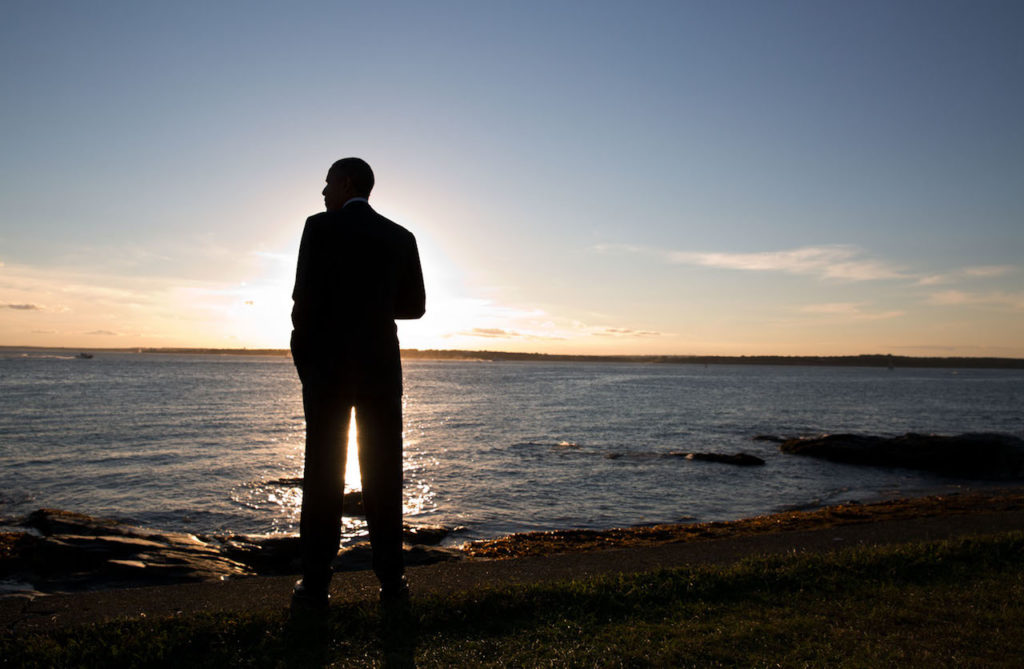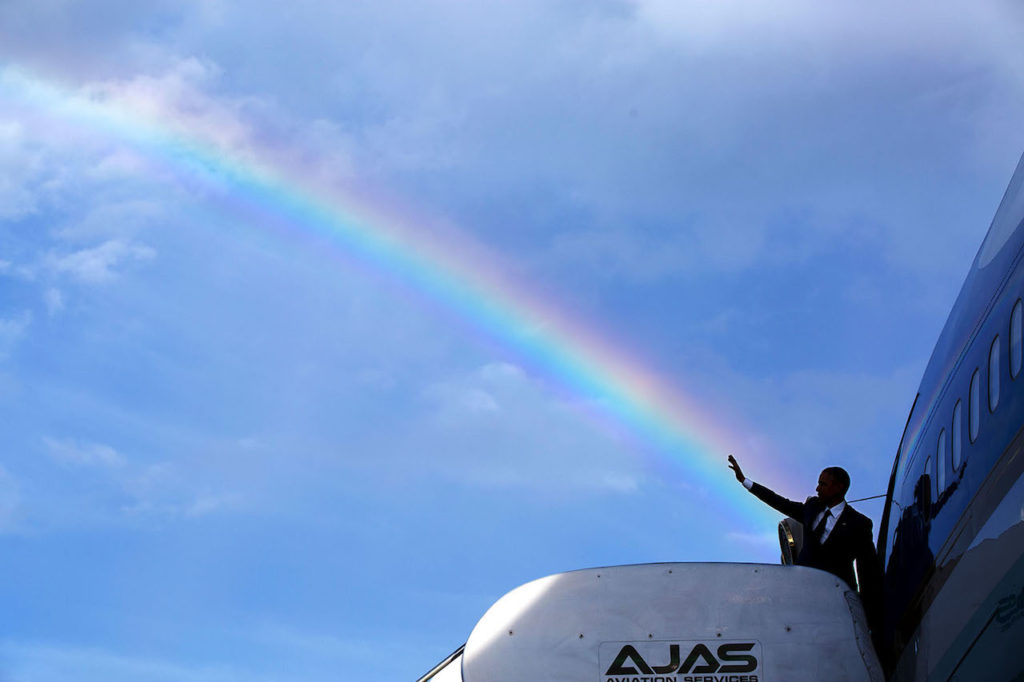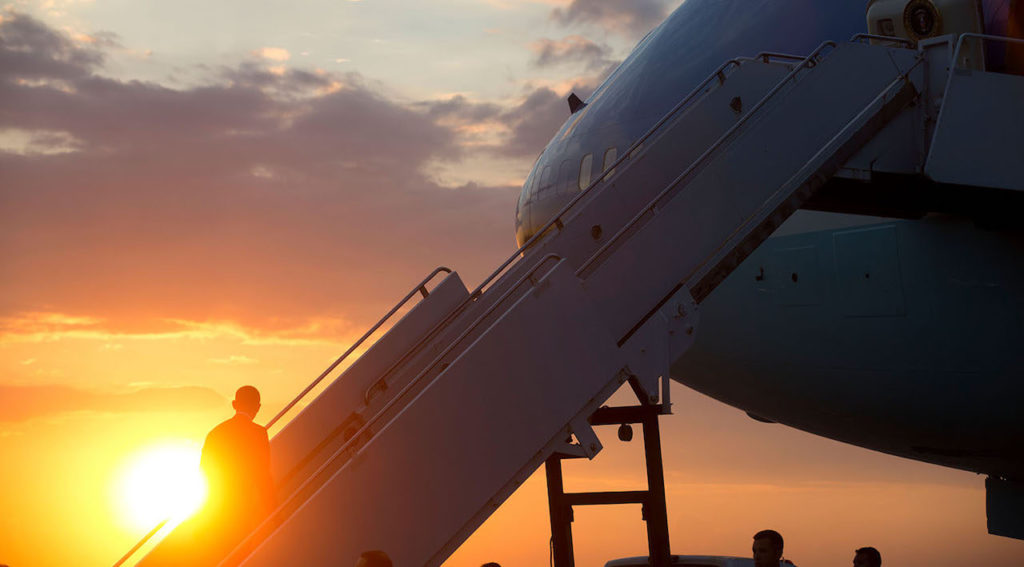How will history define Barack Obama? After eight years, conflicting views on Obama’s legacy

Official White House Photo by Pete Souza
In April 2009, barely three months after taking office, President Barack Obama landed in Port-of-Spain, Trinidad, for the Fifth Summit of the Americas. The visit of the first African-American president, catapulted to office on the theme of “hope and change,” was eagerly anticipated.
Among the hemispheric leaders jockeying for a photo — or a handshake — at the towering Hyatt Regency was Hugo Chavez, the populist president of Venezuela. Just three years before, he had called former President George W. Bush “the devil.” Also in the room: Bharrat Jagdeo, the Guyanese president. Ascending to the presidency almost a decade earlier at the youthful age of 35, Jagdeo was now the elder statesman among his peers. The Caribbean leaders asked that he speak on their behalf during the carnival-themed opening ceremony.
All eyes were on Obama, who entered the packed ballroom like a rock star, recalls Jagdeo.
“This is a very, very smart guy,” Jagdeo told Man of Metropolis. “He’s charming and his incredible intellect is evident immediately.”
In a departure from the American habit of lecturing regional leaders, Obama said he had come to listen and the United States was seeking a new partnership with the region. The leaders nodded as they listened to the words many had longed to hear from an American president. There were also promises made, such as appointing a “special person” in the State Department to deal with any issues that the leaders raised. A couple of days later, Obama jogged up the stairs of Air Force One and flew away. Also up in the air, says Jagdeo, were the promises he made.
“We haven’t seen anything much,” said Jagdeo, who has since left the presidency. “He did set up someone at the State Department but it was a very low-level person and that never worked.”
As Barack Hussein Obama prepares to leave office in less than two months, many at home and abroad have begun to assess his eight years at the helm of the world’s last remaining Super Power. Few – with the exception of his most ardent detractors – can deny that he has scored some historic achievements: halting an economic slide toward another Great Depression, the dramatic transformation of the U.S. relationship with Cuba, major progress on climate change, the killing of 9-11 mastermind Osama bin Laden, championing Obamacare and leading a cultural revolution through his support for gay marriage.
But for many, the change that Obama promised is still to be realized. Among them: those expecting major action on immigration reform or the closing of the Guantanamo base in Cuba. And, like fierce disagreements during his tenure, sharp differences of opinion about his legacy remain.
“Despite bitter opposition, despite having come close to self-inflicted disaster, Obama has emerged as one of the most consequential and, yes, successful presidents in American history,” Paul Krugman, the economist and Nobel laureate, wrote in Rolling Stone magazine.
Obama will be remembered as a transformative president, particularly when his achievements on the economy and issues such as climate change are assessed, says Michael Days, author of the just-released book Obama’s Legacy: What He Accomplished as President.
“We’ve had more than 70 continuous months of economic growth,” Days, publisher of the Philadelphia Daily News, told Man of Metropolis. “I don’t know how you not give him credit for that.”
The conservative columnist Sylvia Thompson begged to differ. Writing on Obama’s legacy, she says those who see Obama’s two terms as a success have been wearing masks. He brought neither hope nor change, says Thompson, who embodies the deep animus engrained in an opposition that’s prepared to continue fighting well after Obama’s gone.
“Should … the 2016 election cycle yield no movement to counter all the harm that Barack Obama has done to this nation, I think there will be massive disruption,” Thompson writes. “Those folks in the National Rifle Association ads currently running on television seem very serious to me and that is a good thing.”
Audacity of Hope
That toxic reaction to Obama seemed unfathomable during the first of my four meetings with him over the years. That first occurred in the fall of 2006 shortly after the ambitious Illinois senator had written his latest book, The Audacity of Hope: Thoughts on Reclaiming the American Dream. The book had been published to rave reviews and his tours took on the feel of rock concerts; the public’s adoration was stratospheric. Indeed, his visit to the Miami Book Fair International was the highlight of the fair. With demand for tickets soaring, organizers scheduled his evening presentation for the historic Olympia Theater at the Gusman Center for the Performing Arts. The 1,700-seat theater was filled to capacity.
Earlier in the day, a mentor had invited me to join a few influential African-Americans at his home for breakfast with Obama. There were murmurs at the time that he might seek the presidency. Some in the lavish sitting room took it seriously; others didn’t. I arrived to have breakfast with a senator and author. I left with little doubt that I had just broken bread with the man destined to become the first black president of the United States.
As in Trinidad, Obama’s words won tremendous praise. But in some cases, his actions lagged well behind his soaring rhetoric. How will his presidency be remembered? It will be difficult for historians to ignore his successes. Here’s a look at some of them.
Economic recovery
When Obama took office, the U.S. economy was on a fast dive toward a depression. The banking and venerable auto industry were collapsing, unemployment was headed to record highs, home prices were in freefall and Americans were a few paychecks from panic. Obama sought to explain what the country was facing and what he planned to do in a speech at Georgetown University in April 2009.
“Our most urgent task has been to clear away the wreckage, repair the immediate damage to the economy, and do everything we can to prevent a larger collapse,” he said.
In frequent meetings with his economic team, the president went to work. He bailed out Wall Street and the auto industry and worked with Congress to pass a $787 billion stimulus package, among other initiatives. Unemployment is now half of what it was in 2009, the economy is expected to grow this year by 1.4 percent compared to negative growth in 2009, and the stock market is approaching all-time highs.
“In just under three months, we’ve responded to an extraordinary set of economic challenges with extraordinary action — action that’s been unprecedented both in terms of its scale and its speed,” Obama said in that 2009 Georgetown speech. Many economists and others have given Obama credit for averting another Great Depression.
“When he came in, the country was headed for a depression, no doubt about that,” said Bryan Monroe, a professor at Temple University’s School of Media and Communication, who covered the Obama presidential campaign. “He saved us from the depression.”
Fight for Obamacare
Presidents had tried for generations to rein in health care costs without success. Perhaps the most high-profile failure to get a plan passed occurred during the Clinton administration when President Clinton tasked the first lady with producing a plan. That failure became fodder for Hillary Clinton on the campaign trail in 2008 and again in 2016.
Obama made it clear that he planned to act on reforming health care within weeks of taking office. At his State of the Union address in February 2009, he put Congress on notice.
“So let there be no doubt: Health care reform cannot wait, it must not wait, and it will not wait another year,” he said.
In pushing for reform, he battled rumors that the legislation contained death panels and later the blow from the death of his mentor, Sen. Edward Kennedy of Massachusetts. Kennedy’s death, denying Democrats a veto-proof margin in the Senate, made Obama’s task even tougher. The Senate passed the bill only after triggering “reconciliation,” meaning it could not be filibustered and could pass with only 51 votes.
At the signing, Vice President Joe Biden famously whispered to Obama: “This is a big f…ing deal!” Supporters cheered.
Despite Supreme Court challenges and more than 60 attempts by Republicans in Congress to repeal the so-called Obamacare, the program survives.
Evolution on same-sex marriage
On June 26, 2015, the Supreme Court legalized same-sex marriage. The decision was celebrated by the White House, where a series of rainbow-colored lights illuminated the landmark.

Official White House Photo by Pete Souza
Although a strong proponent of the court decision, Obama acknowledged that his position on the issue had evolved over time.
He told the Windy City Times while running for the Senate in 2004 that he was a “fierce supporter of domestic-partnerships and civil-union laws. I am not a supporter of gay marriage as it has been thrown about, primarily just as a strategic issue. I think marriage, in the minds of a lot of voters, has a religious connotation.”
As president, Obama had signed the bill to repeal “Don’t Ask, Don’t Tell” in the military. By the time he sat down with Robin Roberts of ABC News in May 2012, he was prepared to go farther.
“At a certain point, I’ve concluded that for me personally, it is important for me to go ahead and affirm that I think same-sex couples should be able to get married,” he said in answer to a question about whether he still opposed same-sex marriage.
Obama’s position was huge in advancing equal rights around the world, wrote Julie Dorf, founder of the International Gay & Lesbian Human Rights Commission.
“These are truly sea change moments for America. Never in our history have we had a president … who so passionately, unequivocally and personally supports LBGT equality – the ramifications of which are felt in LGBT communities across the globe,” she wrote in an op-ed for the Council for Global Equality.
Outreach to Cuba
On Dec. 17, 2014, Obama dropped a bombshell. With almost no warning, he appeared before television cameras in the Oval Office to make an announcement that almost no one anticipated.
“Today, the United States of America is changing its relationship with the people of Cuba,” he announced. “In the most significant changes in our policy in more than fifty years, we will end an outdated approach that, for decades, has failed to advance our interests, and instead we will begin to normalize relations between our two countries.”
The announcement came after months of secret talks between Obama’s aides and Cuban officials in far-flung locations around the world, including at the Vatican. It was immediately denounced in parts of Miami, home to the largest Cuban exile population in the country. But polls showed a majority of the U.S. was in favor of Obama’s gamble.
To some extent, the Cuba opening likely began to take root at that first Summit of the Americas that Obama attended in 2009. Jagdeo, the former Guyanese president, said leaders were unanimous in calling for the U.S to improve relations with Cuba and end the half-century-old trade embargo. Indeed, Obama mentioned in interviews after the policy change was announced that the issue came up repeatedly in meetings with Latin American leaders throughout his presidency.
The policy remains extremely unpopular among many Cubans, especially in Miami, hotbed of opposition to the Castro regime on the island.
“History will show that these overtures to the Castro brothers were a failed and naïve experiment; an idealistic gamble that did not help the people of Cuba achieve any more freedoms under the Castros’ tyrannical rule,” said Republican U.S. Rep. Ileana Ros-Lehtinen of Miami, former chairwoman of the House Foreign Affairs Committee. “Inevitability, the concessions enriched the criminal Castro regime and allowed it to increase its repression against the long suffering Cuban people.”
But Charles Serrano, managing director of Antilles Strategy Group, which has worked in Cuba for almost 25 years, praised Obama for dramatically changing the relationship.
“Obama did a great favor to Cuba by taking the risk and saying that ‘I’m going to be the person to begin the process of normalization,’’’ Serrano said.
Still, he concedes that history might not be so kind to the president because he didn’t go far enough. The embargo remains in place as well as various trade restrictions.
“Obama was horrible in following up,” Serrano said. “He didn’t have the right staff and didn’t have the inclination to end this (the embargo).”
Time will tell
To be sure, Obama has had his fair share of achievements. Others include the much-criticized Iran nuclear deal, sweeping overhaul of the No Child Left Behind education initiative and ending the wars in Iraq and Afghanistan. There have been misses, too, including some blame for the rise of ISIS, failure to close Guantanamo and lack of transformative immigration reform.

Official White House Photo by Chuck Kennedy
“Whether we look at the Iran deal or attempting to normalize relations with Cuba, these sweetheart deals favored our enemies while undermining U.S. national security interests,” Ros-Lehtinen said. “Whether its Russia, Syria, Venezuela, Yemen, or Libya, the foremost legacy will be that inaction or idealistic, misguided, or ineffectual policies ended up doing more harm than good.”
Despite Ros-Lehtinen’s assessment, Temple University’s Monroe and others contend that history will be kind.
“History is going to bode well for Barack Obama. I really think that,” said Monroe, who has closely followed the Obama presidency. “If you look at what he has accomplished, where the country was when he was elected and where it is now, he’ll get very good marks. And if you compare him to his predecessors, he’ll get very, very good marks.”
John Yearwood is chairman of the Vienna, Austria-based International Press Institute and former World Editor of the Miami Herald.



